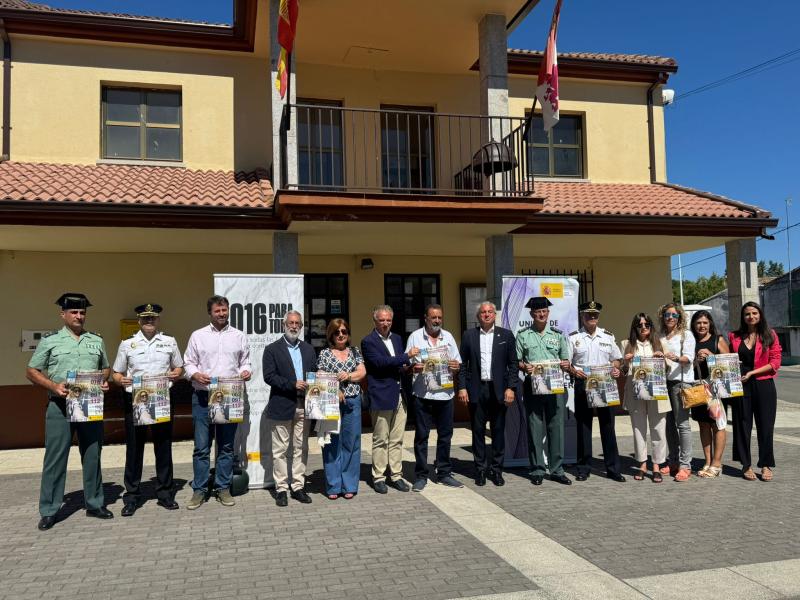Castile and Leon and Extremadura join forces to present the campaign “Do not walk alone” dedicated to strengthening the safety of pilgrims

This campaign seeks to strengthen the safety of women who undertake the Camino de Santiago
July 22, 2025.- The Government Delegations in Castilla y León and Extremadura presented today in the municipalities of Aldeanueva del Camino and La Calzada de Béjar the campaign "Do not walk alone: Camino de Santiago Free of Male Violence.” It is an initiative to strengthen the security of women who undertake this Jacobean route alone or in a group, created and implemented by the coordinator of the Violence against Women Unit of Castilla y León, and which has subsequently been extended to Aragón, Navarra, La Rioja, Galicia and Extremadura.
The campaign has been jointly presented by the government delegate in Castilla y León, Nicanor Sen and the government delegate in Extremadura, José Luis Quintana, In the event they have been accompanied by the subdelegates of Salamanca and Cáceres, representatives of the gender violence units of both communities, as well as the mayor of La Calzada de Béjar, Pio Sánchez
This year, for the presentation of the campaign, the municipalities of Aldeanueva del Camino (Cáceres) and La Calzada de Béjar (Salamanca) have been chosen, beginning and end of stage 16 of the Camino de Santiago through the Silver Route.
In his speech, Nicanor Ser stressed that “the origin of this initiative arose in 2021 by the coordinator of the Violence against Women Unit of Castilla, who created this campaign that is now used in the autonomous communities of Navarra, Aragón, La Rioja, Galicia and the two that we are here presenting it today, Extremadura and Castilla y León”. “A clear example of the importance of collaboration between institutions and of strengthening security along the way,” he concluded.
Likewise, Sen stressed that “the government of Spain is committed to redouble the efforts necessary to try to eradicate any case of male violence that may occur against women”
In her speech, Quintana stressed the importance of collaboration between government delegations to work together on initiatives that pursue common goals. “This is a task for all of us. That is why this year we wanted to do it together with the Delegation of the Government of Castilla y León, so that pilgrims can know, along the Jacobean route, all the available resources against gender violence, and also know that they have the help of the State Security Forces and Bodies in case they are faced with a situation of this type.”
Information points
The campaign includes the dissemination, in different locations, of bilingual information cards and posters that include a QR code that links to the phones of resources specialized in dealing with cases of violence against women.
These informative elements will be distributed in Castilla y León in the provinces of Burgos, León, Palencia, Zamora and Salamanca in: Hostels and Associations of the Camino de Santiago, Town Councils, Commandos and Posts of Civil Guard, National Police Stations, Local Police Units and pharmaceutical establishments.
Agents of the State Security Forces and Bodies distribute this material through hostels and other accommodation located along the Camino de Santiago. In addition, the Colleges of Pharmacists throughout Spain collaborate in their distribution and dissemination in the pharmacies of municipalities through which the different Jacobean routes run. The material is published in Spanish and English.
Alertcops, “Guardian of the Camino de Santiago”
The pilgrims also have the mobile application AlertCops, joint for Civil Guard and National Police. Among the functions of this tool is “Guardian of the Camino de Santiago”, which allows to share the position with the State Security Forces and Bodies so that in case of emergency or risk the police posts can attend to the user more effectively.
The State Security Forces and Corps are also the guarantors of the security of all pilgrims who year after year carry out the Camino de Santiago. In the first half of 2025, 4022 assistance, information and guidance services were provided, 208 pilgrims were assisted and 42 assists were provided.